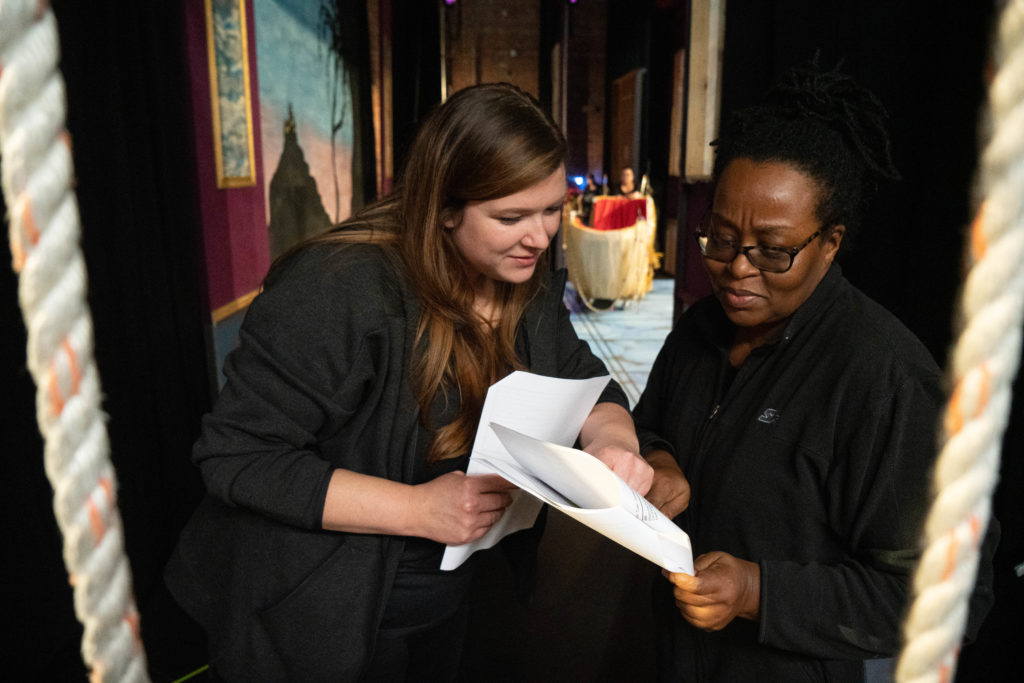Classes and Camps
RLT Announces Free Directing & Stage Management Workshop Series

Photography by Chris Janaro for United Arts Council / A Year in the Life of the Arts in Wake County
Raleigh Little Theatre is excited to announce a new workshop series for aspiring directors and stage managers, sponsored by Blue Cross and Blue Shield of North Carolina. We recognize that, as a field, Theatre Arts needs to provide more training and access to experience to traditionally marginalized groups of people to participate. The purpose of this series of workshops is to offer educational and practical experiences in the areas of Directing and Stage Management to people who have not been historically represented in theatre training.
RLT’s goal is to continue to promote stories and productions which capture these communities’ voices, celebrations, and experiences. Each series will consist of six sessions in Spring 2022 and will be taught by RLT staff and guest teaching artists.
Participants
The aim of these workshops is to provide training to people of the global majority (BIPOC) and the LGBTQIA+ communities. While these communities will be the primary focus of recruitment efforts, all people will be invited to participate.
Cost
These workshops will be free of charge for all participants.
How to Apply
If you are interested in participating in one or more of the workshops, please click here to fill out a registration form.
Applications are open to only BIPOC and LGBTQIA+ identifying individuals from November 19-30. After November 30, we will accept applications from any interested applicants. 50% of the available spaces in each workshop will be held for BIPOC and LGBTQIA+ participants.
The deadline to apply is Friday, December 17.
If you have any questions, please email Patrick Torres.
Workshop Outline & Dates
Directing
Each two-hour workshop will take place in person at Raleigh Little Theatre on the Sundays noted below from 1:00-3:00pm.
Workshop 1: The Role of the Director (January 9)
Participants will examine the role of the director in a theatrical production and practice putting this role into action.
Workshop 2: Bodies and Space (January 23)
In this workshop, participants will explore the various types of theatre spaces; how performers’ bodies and the use of space can have a psychological impact on audiences; and how to demonstrate power, focus, and relationship through dynamic composition.
Workshop 3: Script Analysis (February 6)
This session will focus on how a director interacts with a script in order to successfully communicate the story to their creative team, performers, and audiences.
Workshop 4: How Creating Successful Ground Plans Lead to Successful Blocking (March 20)
Participants will be introduced to the importance of creating dynamic ground plans and how they inspire blocking that successfully communicates a story.
Workshop 5: The Casting Process and Working with Performers (April 3)
This session will have two main focus areas:
- How to lead successful auditions in order to find a strong cast.
- Building positive relationships with performers, creating brave and antiracist spaces for the vulnerable work of creating a play, and inspiring great performances.
Workshop 6: Q&A with Stage Management Workshop (April 10)
In this final workshop, participants will have the opportunity to speak with a panel of local directors/stage managers to gain more insight into moving forward as a director.
Stage Management
Each three-hour workshop will take place in person at Raleigh Little Theatre on the Sundays noted below from 1:00-4:00pm.
Workshop 1: Stage Management 101 (January 30)
This session will serve as an introduction to Stage Management and will touch on the following topics:
- What is a stage manager?
- The Stage Management Team
- Overall role of the stage manager during:
- Pre-Production
- The rehearsal process
- Technical rehearsals
- The run of a show
Workshop 2: Script Analysis for the Stage Manager (February 20)
This session will examine how to go about reading the script from a stage manager’s perspective and will touch on the following topics:
- Reading the script for pleasure
- What are the important elements related to the stage manager?
- How to use the information from the script analysis to:
- Scene breakdowns and French scenes
- Start building a rehearsal schedule
- Create character scene breakdowns
- Build initial scenic, prop, and costume plots
- Take the time to build an electronic script
Workshop 3: The Blocking Process (February 27)
This session will cover the elements of recording and editing blocking notations during the rehearsal process. The following topics will be included:
- Understanding the scenic group plan
- Stage Right and Stage Left
- Determine notations for stage locations
- Use of shorthand notations
- Diagrams verses words for blocking
- Edit changes
- How to include director comments into blocking notes
Workshop 4: Preparing for Technical Rehearsals (March 13)
This session will explore what the stage manager should do to prepare technical rehearsals and how to lead the team through this process. The topics will include:
- What is paper tech
- Working with designers
- Preparing the calling script
- Cue to Cue vs. Run/stop
- Break down complicated cue sequences
- Adding warnings and stand-bys
- Headset etiquette
- Calling the show
Workshop 5: Before the First Rehearsal and After the Show Opens (March 27)
This session will focus on the role the stage manager plays in creating a safe and positive environment for rehearsals and responsibilities after the show opens. The topics will include:
- Taping out the rehearsal space from the scenic ground plan
- Creating daily call, rehearsal report templates
- Communicating with the cast
- Call board
- Picture ‘Who’s Who”
- Paper work prep
- Creating show reports
- Maintaining the artistic integrity of the show
- Fight and intimacy calls
- Working with your ASM
Workshop 6: Q&A with Directing Workshop (April 10)
In this final workshop, participants will have the opportunity to speak with a panel of local directors/stage managers to gain more insight into moving forward as a stage manager.
Sponsor
These workshops are made possible by the generosity of RLT’s Diversity & Inclusion Sponsor, Blue Cross and Blue Shield of North Carolina.
